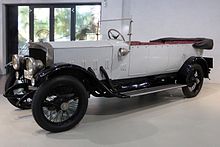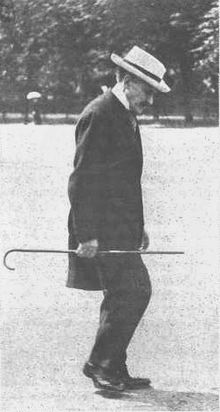Karl Max von Lichnowsky
Karl Max Fürst von Lichnowsky (born March 8, 1860 in Kreuzenort , Upper Silesia , † February 27, 1928 in Kuchelna , Czechoslovakia ) was a German diplomat and from 1912 to 1914 German ambassador to Great Britain .
Life

Karl Max von Lichnowsky came from the Silesian-Moravian noble family Lichnowsky . His parents were Prince Karl Lichnowsky and Princess Marie von Croÿ , a daughter of Prince Philipp Franz von Croÿ. Soon after joining the Prussian army, Karl Max von Lichnowsky switched to the diplomatic service, and from 1887 worked successively in Stockholm, Constantinople, Dresden and Bucharest as well as in Vienna. Lichnowsky paved the way for Bernhard von Bülow's appointment to Rome and Philipp zu Eulenburg to Vienna, and since 1899 has been a lecturer in the Council and Human Resources Department at the Foreign Ministry in Berlin. In 1904 he took his leave, published in democratic periodicals and was sent as ambassador to London at the end of 1912 because of the article German-English misunderstandings (1912), which was obviously misunderstood by Kaiser Wilhelm II . Here he took over the office of Ambassador Adolf Freiherr Marschall von Bieberstein (1842–1912) who died on September 24, 1912 . In London he tried to work towards a compromise between the German Empire and Great Britain and advised restraint in supporting Austria-Hungary . However, his position found no support from Kaiser Wilhelm II and Chancellor Bethmann Hollweg . Lichnowsky's famous telegram of July 26, 1914 ended with the sentence:
“I would like to warn urgently against believing in the possibility of localization even further on, and express the most obedient request that our attitude be guided solely by the need to spare the German people a fight in which there is nothing to be won and has everything to lose. "
With the outbreak of the First World War , Lichnowsky returned to Germany. To justify his position, he wrote a private memorandum . When this memorandum was published against his will and even translated into English, he lost his seat in the Prussian manor house and withdrew from active politics.
family
On August 22, 1904, Lichnowsky married the 19 years younger Countess of Lower Bavaria Mechtilde Christiane Maria von und zu Arco-Zinneberg , who was a great-great-great-granddaughter of Archduchess Maria Theresa . After the wedding, which took place in Munich, the couple lived in Lichnowsky's castles in Grätz and Kuchelna in the Troppau district , which developed into social meeting places. They also had a salon in Berlin, where they bought a house on Buchenstrasse in 1908. The marriage had three children: Wilhelm (* 1905), Leonore (* 1906) and Michael (* 1909).
Fonts
- Prince Lichnowsky's memorandum. My London Mission 1912–1914. Published by a group of friends of peace. Berlin 1918 ( online ).
- On the way to the abyss. London reports, memoirs and other writings. 2 vols. Dresden 1927. (digitized edition under: urn : nbn: de: s2w-12537 )
literature
- Klaus Lindner: Karl Maximilian Prince Lichnowsky (1860–1928). In: Joachim Bahlcke (Ed.): Schlesische Lebensbilder. Volume 9, Insingen 2007, ISBN 978-3-7686-3506-6 , pp. 305-315.
- John CG Röhl : Lichnowsky, Karl Max. In: New German Biography (NDB). Volume 14, Duncker & Humblot, Berlin 1985, ISBN 3-428-00195-8 , pp. 443-445 ( digitized version ).
Web links
- Literature by and about Karl Max von Lichnowsky in the catalog of the German National Library
- Newspaper article about Karl Max von Lichnowsky in the 20th century press kit of the ZBW - Leibniz Information Center for Economics .
- Lichnowsky's memorandum My Mission to London 1912–1914 (English)
Individual evidence
- ↑ The small encyclopedia , Encyclios-Verlag, Zurich, 1950, volume 2, page 49
- ^ The German documents on the outbreak of war in 1914. Published by the Deutsche Verlagsgesellschaft für Politik und Geschichte, Berlin 1921 ( online ).
| personal data | |
|---|---|
| SURNAME | Lichnowsky, Karl Max von |
| ALTERNATIVE NAMES | Lichnowsky, Karl Max Fürst von |
| BRIEF DESCRIPTION | German diplomat, ambassador to Great Britain (1912–1914) |
| DATE OF BIRTH | March 8, 1860 |
| PLACE OF BIRTH | Crossing point |
| DATE OF DEATH | February 27, 1928 |
| Place of death | Berlin |

